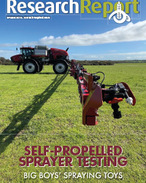This article is 8 years old. Images might not display.
New NIC CEO Steve Whan said the experience of power interruptions in South Australia, on top of high prices, had serious short and long term implications for food and fibre production.
“Power is a key component of irrigated agriculture. That's particularly true of water efficient systems which pump, pipe and pressure the water,” Whan said.
“Irrigated agriculture helps feed Australia. Its product was valued over $15 billion in 2014-15. It’s a core part of putting fresh fruit, vegetables and dairy products on Australian tables.
“But right now, the people growing Australia’s food are getting a double whammy. High electricity prices are making local production less competitive and unreliable supply is stopping the water flowing at critical points in the production cycle.
“Data from one irrigation pump station at Loxton shows the cost of power increasing from $880,000 in 2010 to over $1.8 million in 2017, a 107 per cent increase which can only be passed on to farmers. Add to that black outs and farmers must wonder what they are paying for.”
It is forcing growers to investigate the viability of renewable power sources.
Queensland irrigator John Russo has developed a solar powered pump that cuts power bills without reducing reliability.
Russo, who has a 200 hectare cane farm in the Queensland’s south Burnett region, told ABC Rural the combination of solar panels, a variable speed driven pump and a centre pivot irrigator had allowed him to triple the size of his peanut plantings.
He expects future power bills to be slashed in half.
"I think the net back to me is something like $20,000 per annum so on investment it's about 13.5% on investment return [for] maybe six or seven years," Russo said.
"Beyond that my energy is very cost efficient."
Whan said the ‘so-called energy market’ was not working.
“The NIC advocates a policy response aimed at reigning in costs, including reforms to pricing and market regulation.
“While we would be delighted to have affordable power from renewables, we have consistently highlighted the danger of failing to have enough synchronous generators, in particular in South Australia.
“It lacks genuine competition and appears dominated by maximising returns to generators and infrastructure owners instead of industrial consumers, including irrigators.
“It’s time all political parties recognised that the implications of continuing to get this wrong include impacting our Nations’ ability to produce affordable and internationally competitive food and fibre.”























